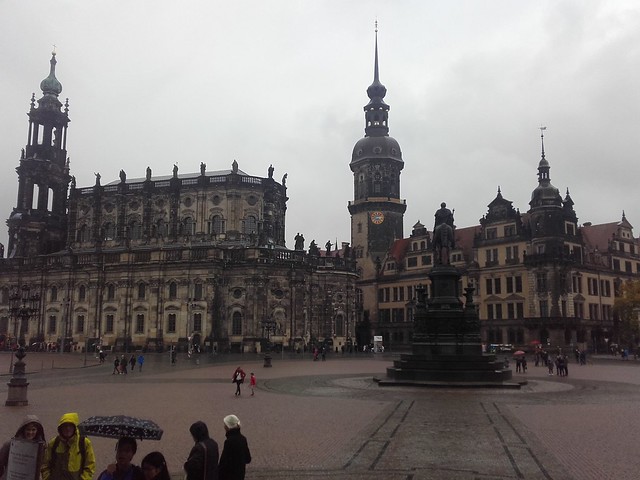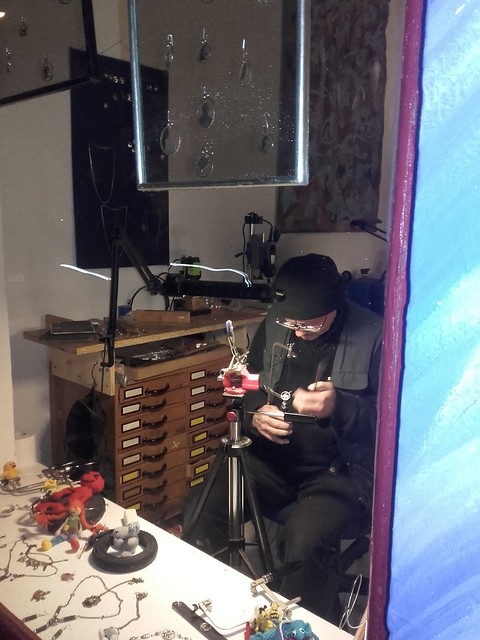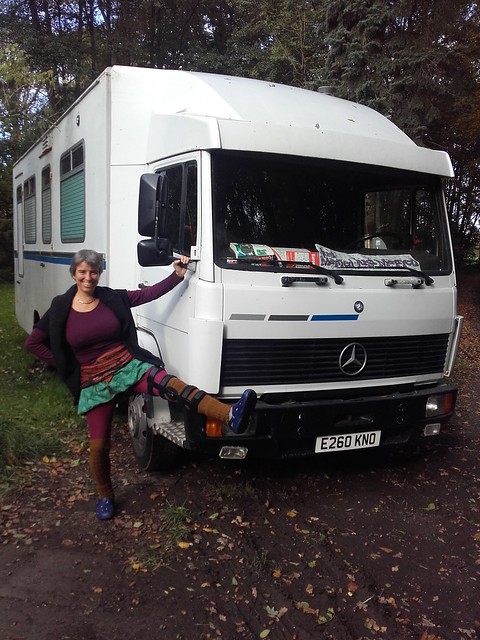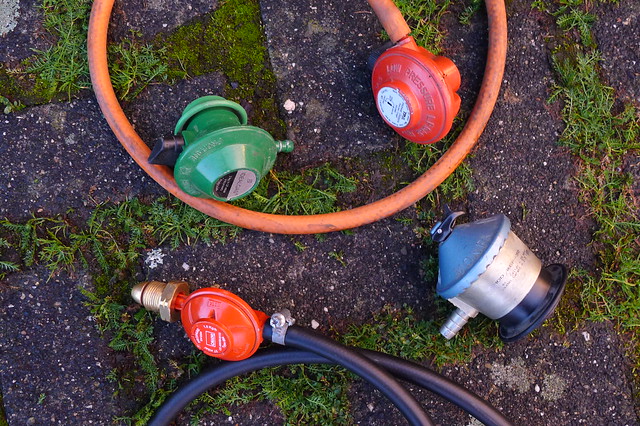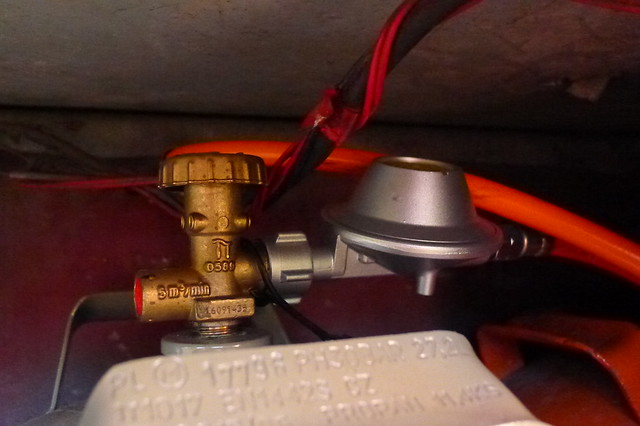Autumn in Germany
Autumn must be one of the best times to travel through this beautiful part of rural Germany. We are leaving Proitze just in time – large groups of cranes fly overhead, tempting us to move southwards with them – we hear their eerie cries and then we see them in big V-formation, 50-200 birds at a time. It’s beautiful to watch them as they circle on a thermal wind to get higher up, then forming their long lines to set off South.
The migration of cranes usually means cold weather within a week or two, so it’s high time that we get going too…
If you want to see a typical part of Germany where at least, at first glance, one can think that man and landscape are living in pretty good harmony with each other, then start from the Wendland and drive South and slightly east from there, travelling through Thueringen and the Harz. The woodlands are stunning right now, the sunlight on the leaves of all colours creates a feast for the eyes. Last night, a big full moon rose out of the forest above the misty meadows, just like it should do in Germany, according to one of its most famous lullabies:
Der Mond ist aufgegangen
Die goldnen Sternlein prangen
Am Himmel hell und klar,
Der Wald steht Schwarz und schweiget
Und aus den Wiesen steiget
Der weisse Nebel wunderbar.
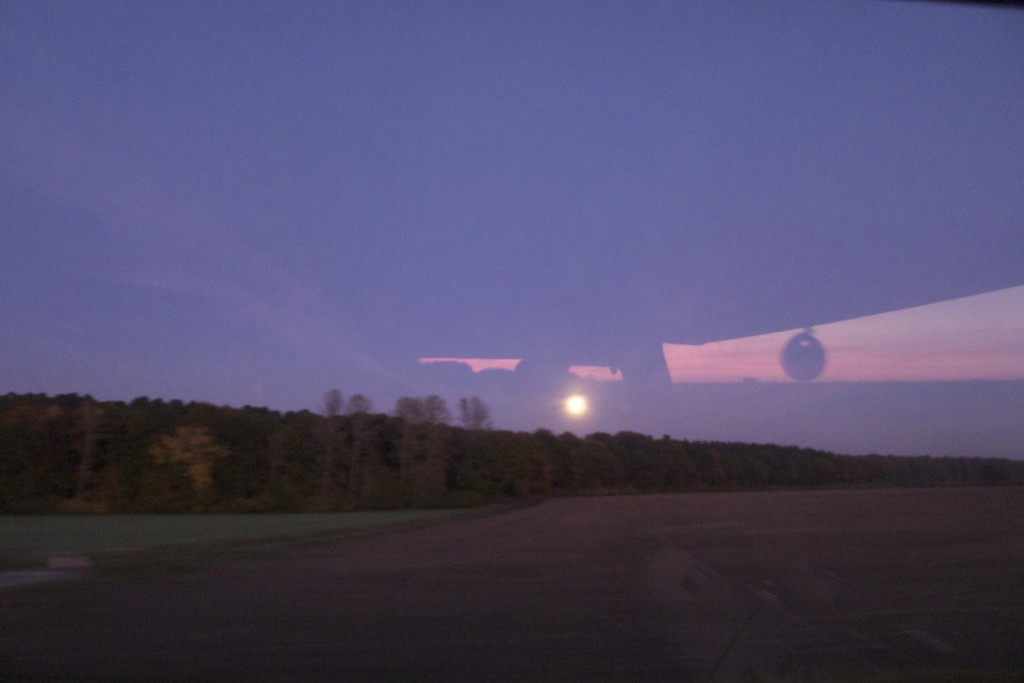
Full moon rising. Photo taken from inside the driver’s cabin. the window’s reflection of the sunset behind us can be seen in the sky above the moon.
A frosty night with not a breath of wind, so all the beautiful leaves are still on the trees for us to enjoy as we travel from Helmstedt further South.
The next morning, the world is shrouded in a misty silence and remains so for most of the next two days as we cross first Sachsen-Anhalt and then Thueringen. Some of the trees are now bare, with a golden carpet beneath them. Forests appear out of the mist with the colours gradually materialising as we drive towards them. We stop overnight in Nordhausen where we spend some time in the beautiful new Library, catching up on news on the internet and sending long overdue emails.
We drive on, and as darkness settles in (shockingly early since the change from Summertime to Wintertime!) our conversation turns introspective. I’ve been wondering why here in Germany I don’t have the same drive to meet new people and make interesting connections, to stop and chat in the way that we’ve done in Spain or Portugal. Maybe it’s because they are my people? That I somehow feel there’s not much novelty in it for me, not so much to learn or discover? But talking to Frank I find out it’s the same for him. So maybe the people are not curious about us, so don’t seek a deeper contact with us. People are not unfriendly though….In the end, we realise that we are not yet going slowly enough to create the situations where we can truly meet people and be open for that special conversation. Last year it took us 6 weeks to slow down. This year, we haven’t had a chance yet to slow down, as October in Germany was interspersed with 3 weekend workshops and one whole week of Tango, necessitating criss-cross travel to get to the right place at the right time.
After this conversation, I meet a woman behind the till at a fuel station with another smile, another mind-set, and time to linger… with instant results 
Refuelled and with lots of info on local attractions, we travel on and plunge into another conversation of reflection, this time about relationships in the past and our fears and hopes when we were both younger. Frank is in the middle of talking about the year he took his one-man show on tour, when it happens. We are on a fairly straight stretch of road and someone comes towards us on our side of the road, at high speed. Frank and I see it at the same time. In this moment, time slows down. I take a deep in-breath and feel the full impact of the helpless inevitablility of the situation. Frank flashes the lights at the oncoming car. In the last moment, the car rights its path and swerves back to the other side of the road. We both breathe out. Another life has been granted to us, and to the person(s) in the other car. A reason to celebrate, and a sharp reminder never to take any moment for granted.
Posted in Uncategorizedwith 1 comment.
Dresden (Frank’s Story)
Dresden – what an unexpected surprise! Hitherto my image of this city was born out of the extraordinary Kurt Vonnegut novel Slaughterhouse 5, about the systematic fire-bombing by the British, which ravaged the city in WWII. So, whilst Ruth was teaching a week-end Tango Musicality workshop for the wonderful Carsta and Alex – guest teachers at last Summer’s Mango – I got to explore… and found a thriving city full of grand buildings, museums, cathedrals etc, a lot of which had been painstakingly restored or re-built , before the wall came down, to their original design… such that I was fooled into thinking they had survived the war!
I think it was Friedrich Augustus who first laid out the grand plan and I came across his golden statue on my wanderings. He had the reputation of being a strong ruler, who sired over 200 children !
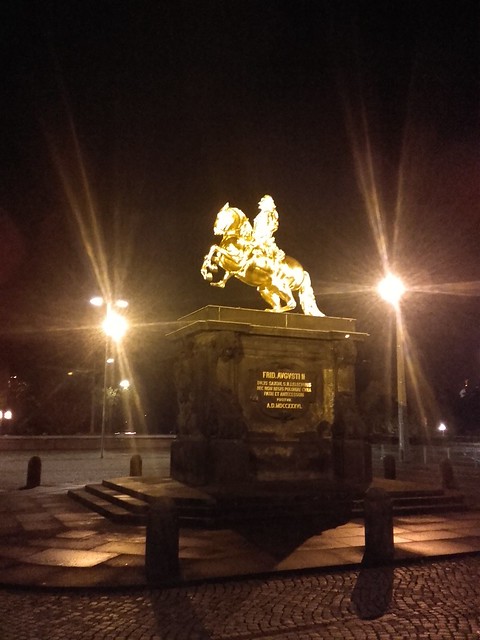
The weekend also coincided with the quarter-finals of the RWC and I went in search of an Irish pub, proudly sporting my Wales top and red scarf. I found 3, all run and owned by a Londoner who’d settled there 7 years ago. I soon hooked up with a very sociable Dresdener, Günnar, who turned out to be surprisingly knowledgeable about the game – the teams and individual players included! It turned out that the first of the 3 couldn’t get ITV, so we headed off for the second just in time for the build up to the match. Although there were a fair number of supporters settled in for the game, we still had to ask for the sound to be turned up – Rugby is virtually unheard of in Germany and there was a feeling that the management didn’t want to upset the clientele who’d simply come to eat… Anyway, it was a thrilling game which Wales narrowly lost to Australia, in spite of the very loud rendition every 15 minutes of ‘Hymns and Arias’, by the North Walian sat next to me! For the evening game Günnar and I had to de-camp to the 3rd pub, over the magnificent Elbe in the old town, now a warren of cafes, alternative eateries and shops.
There we could only watch the game with the sound off, as there was live music, tho’ they did make one concession – for the Haka! After the game I made my way back to the outskirts, where Carsta and Alex have a beautiful house and Tango studio, via a funky little Indian restaurant in the Old Quarter. It was gone one when I got back and there were no lights on anywhere and rather than wake up my hosts, I decided to climb the rather imposing gates to the property. All went well til the drop on the other side – I hadn’t taken into account the curve on the gate and ended up with all my weight on one wrongly-angled wrist. I vaguely remember a slight click as I let go but wasn’t in any way prepared for the excruciating pain and swelling 24 hrs later. After an x-ray and CT scan at the very efficient A and E unit of the main Hospital, I was dispatched with a wrist support and orders to rest….Ruth too had had her aggravated knee X-rayed and she left with a knee brace and crutches! Our onward journey to Proitze in the North, where Ruth had her next week-long teaching assignment, was thankfully taken care of by Alex and Carsta. They were also attending TangoLab’s intensive course and dropped us off at Emma’s door in Helmstedt, from where we’d caught the train to Dresden. Despite her state, Ines the TangoLab’s organizer, insisted Ruth give her daily Tango Musicality sessions… and so, with our 3 functioning arms and legs, we tackled the last 120km – I steered with my good hand and took care of the pedals while Ruth shifted gears on my ‘cues’ !
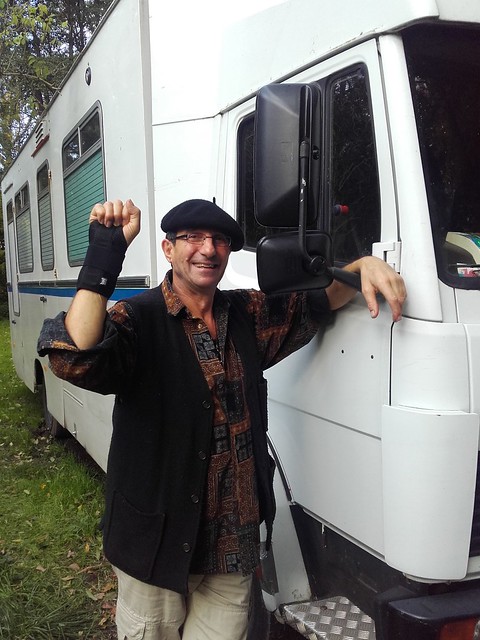
Now, after a hectic month criss-crossing Germany, we’re heading South and looking forward to a gentler time all round.
For more pictures, go to flikr.
Posted in Uncategorizedwith 2 comments.
Travelling Eastwards
After a lovely weekend of Tango workshops in Lohne hosted by Gertrud, we set off eastwards in the direction of Dresden. The weather last week was stunningly beautiful in the day, with the autumnal sun bringing out the colours in the turning leaves, but now rain is settling in and in addition to it being cold it’s now also turned wet. Luckily we have our wood store stacked full of wood and kindling, so we should be nice and warm for a while. Along the way, we pick up autumnal produce – large walnuts, juicy pears, red-cheeked apples – often sharing the public trees with several other collectors. Nothing goes to waste here; in fact, people drive for miles to get to their favourite walnut tree or take a bus to pick up ripe pears from the communal orchard. The houses are surrounded by stacks of wood, and the smell of ripe quince wafts over garden walls. We come past some farms that are aglow with stacks of orange pumpkins. We drive through beautiful forests for miles and miles, interspersed by further miles of maize fields and bio-gas processing plants.
In the evening, we stop in Rodewald, a little roadside village that time forgot, but nevertheless it has a parking place for campervans. We meet a man collecting fruit in a cloth bag. He tells us that he was born in East Prussia in ’31, was 14 when the war finished and he got taken prisoner by the Russians and condemned to forced labour for 3 years. The war had already taken its toll on him, so he was 5foot tall and only weighed 70lb! This was not to change for three years, he tells us. The Russians took away all the animals and drove them to the Caucasus – not a single chicken was left – leaving a whole area to feed themselves on potatoes and cabbage only.
When he was released, he emigrated to Rodewald, where he found work with a farmer and grew 20 cm in two years. Life was hard here too, he said, but he managed to go to school and integrate into his new surroundings and start a family. ‘They want to put Syrian refugees in every empty house here, but that’s a bad idea, there is no work here. It was difficult enough for us after the war, when there still was work to be had on the farms, in the local oil industry and the VW factory. But now, the farms are dead, the oil has stopped and we have so many cars, we can sell them to Timbuktu. What are those people going to do here?’ Another mistake, he says, is to grow maize for fuel. ‘You’d only need to plant half of the amount and feed it to animals, you’d have more profit’.
Rodewald is a rainy shit hole, he says, and he envies his grandson who has gone to live in Australia. Maybe I’ll join him, says the 84 years old, who insists that we take his cloth bag full of fallen pears. ‘I come here every day, I’ve got lots of them at home’, and he waves us good-bye as he goes to catch his bus home.
Posted in Uncategorizedwith no comments yet.
Van Matters
European standardizing may prescribe the bend in bananas, but it has not reached the world of gas bottles. Every time we enter a new country, we have to change to a new system, gas bottle and all. By now, we have 5 adapters and two hoses, and in the last year, we’ve had 6 different gas bottles.
Enter the German arena, where every other country’s system is declared illegal, in fact life threatening. It doesn’t matter that Emma has recently been inspected by a UK certified plumber and has a Gas Safe certificate. Apparently, if we get stopped on the road here, we could get fined, and personel at a camping place may request to inspect the system and send us off the camp ground if found wanting. It would be relatively easy to convert to a German system ( still costing around 100 Euros), but the German system seems irremovable, with a kind of screw that eats itself into the thread. This would cause problems in all subsequent countries… We visit 4 different camping accessories and gas bottle shops before we strike lucky with GasProfi24 in Bonn, where a very friendly young man named Christian helps us find a solution. We are now the proud owners of a German adaptor, hose and bottle…which we can swap again once we get down to Italy!!!
Christian is about to go on a two-week holiday to Kos, to visit relatives. We ask him how the refugee situation has impacted on his family. He reckons that the media are distorting what is happening in Kos, creating an impression that the whole island is overrun by refugees. He says unless you are right by the port where people need to register with the police, you don’t notice that much difference. He thinks that Athens is much more affected.
Conversation everywhere in Germany, even with strangers, turns to the plight of the refugees within minutes. In Zons, where we visit my friend Lotte once more, I speak to a car park attendant and toilet cleaner, a simple-minded person, who admits himself that he would normally be suspicious of strangers. But somehow in Germany, the message has got across to put oneself into the place of the refugees and see things from their side. There is a German expression that says someone doesn’t look beyond the rim of their own plate. This man was such a person, but even so, he had compassion for the refugees. Mr. Car Park tells me in no uncertain terms that if Germany was a war zone, he’d flee too, who wouldn’t? You would flee too, he tells me, he’s sure of that.
As if ISIS is not enough, Russia and the USA are now bombing Syria too. I don’t know what the right solution is, but somehow I can’t imagine it makes a difference whose shrapnel destroys your house and kills your family when you are at the receiving end.
****
For some photos of the beautiful little town of Zons and a little story involving pigs, plus a couple of photos of my charming husband, go to Flikr.
Posted in Uncategorizedwith no comments yet.
People on the Move
We spend a couple of nights in Köln before taking a flight to Berlin where we will stay with Ines for a week. We are full of the impressions from the Jungle, so conversation with my sister and her husband centres a lot around the current plight of the refugees. We hear that in Germany, after München having been overwhelmed by the amount of refugees arriving from Austria, various cities now take turns to receive refugees by the hundreds. It so happens that this weekend, it is the turn for Köln – several train loads are due to arrive this night, bringing in the region of 1300 refugees in the space of 24 hours. They arrive at the train station of the airport, from where they go to a reception area where they get basic help, food, water, clothes, medical first aid and access to the internet. From there, they are taken to a tent city that has been built for the purpose, after which they are relocated to more permanent locations, individual or group housing all across Nordrhein Westfalen (a county about the size of Wales), with many agencies cooperating to make this transition as smooth as possible. The aim is to get them distributed quickly and to enable them to integrate and work as soon as possible.
Normally a stickler for regulations, Germany has waived a number of building regs to allow old buildings to be used which don’t conform to the standard regulations for public housing, such as school halls, old army barracks etc., to give people a roof over their heads as soon as possible. Bayer, a big chemical factory, has given the option of 8 days paid leave to its workers if they choose to help the charities who deal with the arrival of the refugees.
Managers of big companies go into the tent cities to headhunt trained personel. Job checks still have to be made, to assure there isn’t a German (and then European!) worker who could take the job, but they are being sped up from 15 months down to 3 months, to get people into a working situation asap, to avoid tax spending and help people acclimatise. There is a strong recognition that not allowing someone to work will hugely increase the problems, especially with young male adults and heads of families. There is such a contrast to the long waiting times in the UK!!!
There is a thought that this wave of refugees might be the more wealthier and more educated part of the population – people who had the money to buy themselves a costly place on a dodgy boat – and that the next wave will be the less moneyed. People feel that once the refugees are on their way, one has to open their countries to them, it would be inhumane not to. However, there is a feeling amongst Germans that other countries should take their fair share too, or if not, contribute money towards a European refugee fund. One radio speaker floated the figure of 6500 Euros per refugee, which would help bridge the gap between their arrival and their contributing to the society. There is an understanding that one cannot force a quota of refugees on a society which has a strongly negative attitude towards them (such as Hungary), it wouldn’t be fair on those seeking to find a place for a peaceful existence.
Germany is set to receive 800 000 refugees this year alone. Compare that with 20 000 in the next 5 years that Cameron has been pushed to agree to allow into the UK as a whole. Germany also has a strong military presence in the Mediterranean to aid with sea rescue operations (and secondarily to help catch human traffickers) – for the German army this is the largest military operation outside of Germany since the second world war.
What do people here think of the situation in Calais? They think that the way France and the UK treat refugees is ‘Menschenverachtend’. Google translates this as ‘inhuman’, but I would say it’s an even stronger word than that. ‘Menschenverachtend’ literally means ‘despising of humans’.
Posted in Uncategorizedwith 2 comments.
